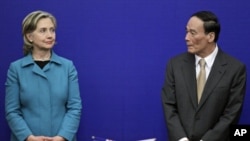U.S - China relations faced a wide range of challenges in 2010 as ties between the world's two biggest economies were tested more broadly than ever before. Regional experts say that managing one of the world's most important relationships is getting tougher and that the trend will likely continue.
2010 began with a downturn in U.S.-China relations. Beijing cut military ties with Washington, following a U.S. arms deal with Taiwan and the Internet search firm Google announced that it was the target of a sophisticated cyber attack that originated in China.
In February, U.S. President Barrack Obama met with Tibet's spiritual leader, the Dalai Lama, despite strong protests from Beijing. That raised questions about whether Chinese President Hu Jintao would attend Mr. Obama's Nuclear Security Summit in April. But in the end, Mr. Hu attended.
Relations between the two countries are increasingly intertwined, complex and far reaching. Cheng Li of the Brookings Institution here in Washington, calls U.S.-China relations "a paradox."
"It is a paradox of hope and fear; it is a paradox of progress and tremendous problems, a paradox of confidence and possible disaster," Cheng Li said.
Although the two nations found ways to cooperate in 2010 on alternative energy, they clashed over the value of China's currency and other trade issues.
Bonnie Glaser with the Center for Strategic and International Studies here in Washington says it was difficult for the United States and China to find ways to cooperate. It was a year, she notes, replete with incidents that caused friction between the two countries.
"I think that both sides have found it very difficult to manage the relationship and really keep the tone positive," Glaser said. "And with Hu Jintao's visit coming up in January [2011], [it] really raises a big challenge for both countries. What is the positive story that we can now tell about this relationship? What are the issues that we can cooperate on?"
Glaser says tensions on the Korean peninsula, and finding a way to deal with North Korea and its provocative actions during the past year is an example of that lack of cooperation between China and the United States.
"Ever since the sinking of the Cheonan, the South Korean vessel in March, China's unwillingness to point a finger at the North Korea, to condemn North Korea as the provocateur; it's unwillingness in the U.N. Security Council to name North Korea,I think that was a negative story for the U.S.-China relationship," Glaser said.
The South China Sea, an area China claims as its own, was another point of contention. The United States offered to facilitate territorial disputes between China and its Southeast Asian neighbors. China rejected the offer.
One month later, Beijing announced it had sent a manned submarine to the bottom of the South China Sea and planted a Chinese flag.
Glaser says it served as a reminder of China's growing military status and as a subtle message to countries that also have claims in region.
"The fact that the Chinese have the capability to do that is a signal to their neighbors that they are far more advanced than all of the other claimants and that, therefore, other countries should take that power imbalance into account when they talk with the Chinese about these issues," Glaser said. "
Largely unaffected by the global financial crisis, China has becoming more assertive about its global intentions, raising concerns internationally.
According to Cheng Li of the Brookings Institution says China and the United States are on a dangerous course.
"When you think China's threat is real and then it becomes real. At the same time, if you think U.S. policy is anti-China, [that the United States] wants to contain China, sooner or later you will want to reinforce that kind of thing," Cheng Li said. "It will become real. So that is a danger. And that danger certainly escalated in a fast way in 2010. I think the outside world needs to come to terms with China's rise because the era of China serving as a student to be lectured by the West, is coming to and end."
Analysts note that as China's global influence grows, so does its responsibilities as a player on the world's stage.
Sophie Richardson is the Asia Advocacy Director for Human Rights Watch in Washington.
"The kind of progress that we have seen in China, infrastructure, economic, and to some extent social freedom, many of these are remarkable, and they are a clear choice on the part of the Chinese government," she said. "But there hasn't been a commensurate increase in basic civil and political rights. And that too is a very clear choice."
Analysts note that as China's economic and political power increase, so, too, do expectations of the country, at home and abroad. That leaves Beijing with a choice, analysts say, to meet those expectations or to ignore them.




